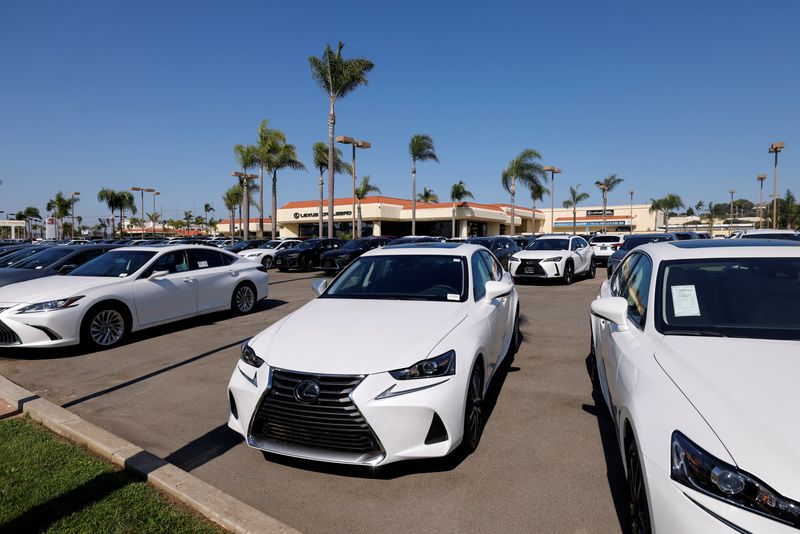By David Shepardson
WASHINGTON (Reuters) -The U.S. Environmental Protection Agency (EPA) on Wednesday proposed sweeping emissions cuts for new cars and trucks through 2032, a move it says could mean two out of every three new vehicles automakers sell will be electric within a decade.
The proposal, if finalized, represents the most aggressive U.S. vehicle emissions reduction plan to date, requiring 13% annual average pollution cuts and a 56% reduction in projected fleet average emissions over 2026 requirements. The EPA is also proposing new stricter emissions standards for medium-duty and heavy-duty trucks through 2032.
The EPA projects the 2027-2032 model year rules would cut more than 9 billion tons of CO2 emissions through 2055 - equivalent to more than twice total U.S. CO2 emissions last year.
Automakers and environmentalists say the administration is moving quickly in order to finalize new rules by early 2024 to make it much harder for a future Congress or president to reverse them. Then President Donald Trump rolled back tough emissions limits through 2025 set under Barack Obama but the Biden administration reversed the rollback.
The agency estimates net benefits through 2055 from the proposal range from $850 billion to $1.6 trillion. By 2032 the proposal would cost about $1,200 per vehicle per manufacturer, but save an owner more than $9,000 on average on fuel, maintenance, and repair costs over an eight-year period.
John Bozzella, CEO of the Alliance for Automotive Innovation representing General Motors (NYSE:GM), Volkswagen (ETR:VOWG_p), Toyota and others, said "factors outside the vehicle, like charging infrastructure, supply chains, grid resiliency, the availability of low carbon fuels and critical minerals will determine whether EPA standards at these levels are achievable."
The proposal is more ambitious than President Joe Biden's 2021 goal, backed by automakers, seeking 50% of new vehicles by 2030 to be electric vehicles (EVs) or plug-in hybrids.
The Biden administration is not proposing banning gasoline-powered vehicles, but wants comments on whether it should extend emissions rules through 2035 and on other alternatives. Some environmental groups want the EPA to set tougher rules, especially on heavy trucks.
The United Auto Workers union, which has warned previously about job losses from the shift to EVs, said it would review EPA's proposal.
"There is no good reason why electric vehicle manufacturing can't be the gateway to the middle class that auto jobs have been for generations of union autoworkers. But the early signs of this industry are worrying," the UAW said. "Forcing workers to decide between good jobs and green jobs is a false choice."
EPA Administrator Michael Regan declined to endorse setting a date to end the sale of new gasoline-powered vehicles. He emphasized the proposal is a "performance-based standard" and not an EV mandate.
"We're not driving any particular technology out of business -- so to speak," he said.
Under the EPA proposal, automakers are forecast to produce 60% EVs by 2030 and 67% by 2032 to meet requirements - compared with just 5.8% of U.S. vehicles sold in 2022 that were EVs. The National Highway Traffic Safety Administration plans to propose parallel economy standards in the coming weeks.
California in August moved to require all new vehicles sold in the state by 2035 be electric or plug-in electric hybrids, but must still seek an EPA waiver to proceed. Regan would not to say how the EPA would react to a California request. "We'll be on the lookout for that if it were to ever come," he said.
Republican Senator Shelley Moore Capito said called the proposal "misguided" and said "the Biden administration made clear it wants to decide for Americans what kinds of cars and trucks we are allowed to buy, lease, and drive."
Dan Becker, director of the Safe Climate Transport Campaign, said the EPA proposal should have been tougher.

"Automakers talk out of both sides of their tailpipes, promising electric vehicles while delivering mostly the same old gas-guzzlers and lobbying for weak, loophole-riddled rules," Becker said.
Under the proposal, the EPA estimates 50% of new vocational vehicles like buses and garbage trucks could be EVs by 2032, along with 35% of new short-haul freight tractors and 25% of new long-haul freight tractors. Medium-duty vehicle rules are projected to cut emissions by 44% over 2026.